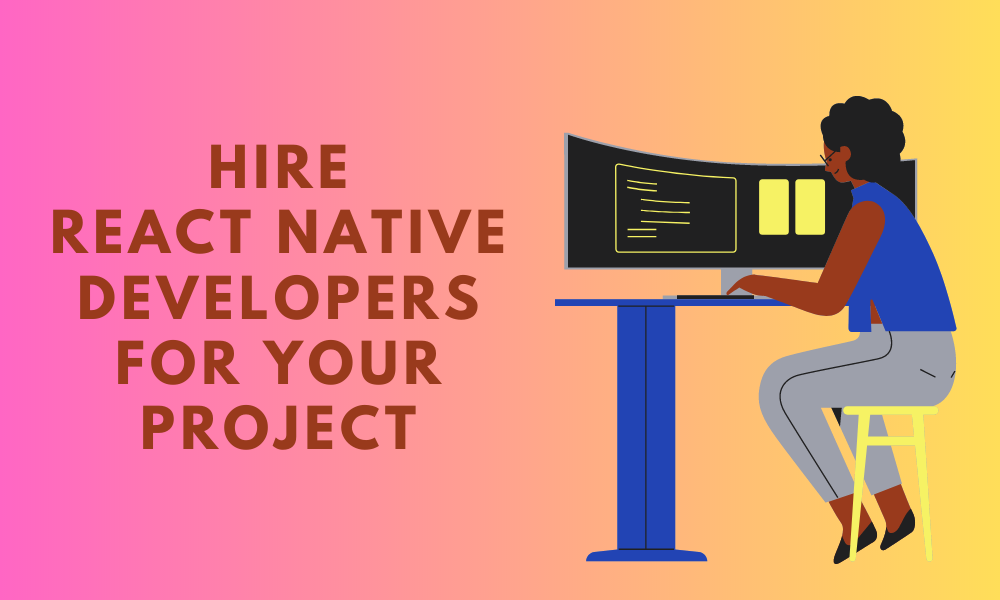Top advantages of hiring a React native developer for your project

Hiring a React Native developer for your project can offer a wide range of advantages that can significantly impact the success and efficiency of your mobile app development. React Native, a popular open-source framework developed by Facebook, allows developers to build mobile applications for both iOS and Android platforms using a single codebase. This technology has gained immense popularity in recent years, making it a smart choice for businesses and organizations looking to create high-quality, cost-effective, and cross-platform mobile apps.
Below are a few of the most significant advantages of hiring a React Native developer for your project:
Cross-Platform Development:
React Native is renowned for its cross-platform capabilities. It enables developers to write a single codebase that can be used for both iOS and Android apps. This approach streamlines the development process, reduces development time and costs, and ensures consistency across platforms. Hiring a React Native developer allows you to target a broader audience without doubling your development efforts.
Cost-Efficiency:
When you hire a React Native developer, you can save money compared to developing separate native apps for iOS and Android. A single codebase means fewer development hours and less maintenance, which translates into reduced expenses. This cost-efficiency is especially valuable for startups and small businesses with limited budgets.
Faster Development:
React Native significantly accelerates the development cycle. Developers can leverage pre-built components, libraries, and tools to expedite the coding process. Additionally, the “hot-reloading” feature allows real-time code updates, making debugging and testing more efficient. Faster development means quicker time-to-market, enabling you to seize business opportunities promptly.
Reusable Code Components:
One of the core advantages of React Native is the ability to reuse code components. This not only saves time but also maintains consistency and minimizes the likelihood of bugs or inconsistencies. It also simplifies the process of rolling out updates and adding new features.
Strong Community Support:
React Native has a vast and active community of developers and contributors. This ensures the framework’s continuous improvement and the availability of a wealth of resources, including libraries, plugins, and documentation. When you hire a React Native developer, they can tap into this supportive ecosystem for troubleshooting and staying updated with the latest trends and best practices.
User Experience (UI/UX):
React Native facilitates the creation of smooth and responsive user interfaces. It provides a set of native-like components that enhance the app’s performance and appearance. This helps in delivering a superior user experience, which is crucial for user retention and satisfaction.
Simplified Maintenance:
With a single codebase for both platforms, maintenance becomes more straightforward and cost-effective. When you want to introduce new features or address bugs, you only need to make changes once, saving time and effort. This streamlines the ongoing maintenance and support of your mobile app.
Native Module Integration:
React Native allows for the integration of native modules, meaning that you can include platform-specific code when necessary. This is valuable when dealing with hardware features or native capabilities that aren’t readily available in the framework. Your React Native developer can seamlessly incorporate native code into your app when required.
Speed and Performance:
React Native apps are known for their speed and performance, as they leverage the device’s GPU (Graphics Processing Unit) for rendering. This results in a highly responsive and efficient mobile app, which is essential for engaging users and delivering a seamless experience.
App Store Approval and Updates:
React Native apps typically have a smoother approval process in the App Store and Google Play. Moreover, when it comes to releasing updates, the single codebase simplifies the process, and updates can be pushed to both platforms simultaneously. This reduces the time and effort involved in managing app updates.
Third-Party Plugins and Libraries:
React Native boasts a vast ecosystem of third-party plugins and libraries, which can be easily integrated into your app. These plugins can add functionalities, save development time, and enhance the capabilities of your mobile application.
Scalability:
React Native is highly scalable, making it suitable for projects of varying sizes. Whether you’re building a small MVP or a complex enterprise-level app, React Native can accommodate your needs.
Synchronized Development:
Hiring a React Native developer allows for synchronized development. Changes made to the codebase are automatically applied to both platforms, ensuring that iOS and Android versions are always in parity. This simplifies the development process and avoids inconsistencies between platforms.
Robust Testing Tools:
React Native is equipped with powerful testing tools that help in identifying and resolving issues early in the development process. This ensures a more stable and reliable app, reducing post-launch bug-fixing efforts.
Accessibility:
React Native emphasizes accessibility, making it easier for developers to create apps that are inclusive and can be used by people with disabilities. This is not only a legal requirement in many regions but also enhances the overall usability of your app.
Community Feedback Integration:
React Native developers often engage with the user community, gathering feedback, and addressing issues. This feedback-driven development approach can lead to a more user-centric and successful app.
Internationalization and Localization:
React Native supports internationalization and localization, making it easier to create apps that cater to a global audience. You can easily adapt your app to various languages, regions, and cultures.
Code Reusability with Web:
React Native shares a core philosophy with React, which is a popular JavaScript library for building web applications. This means that you can potentially reuse some code and knowledge when developing both web and mobile applications, further optimizing your development efforts.
Availability of Skilled Developers:
With the increasing adoption of React Native, the talent pool of skilled developers has grown considerably. Hiring a React Native developer is relatively straightforward, and you have access to a diverse range of professionals with expertise in the framework.
Versatility:
React Native isn’t limited to just mobile app development. It can also be used for building other types of applications, including web apps and desktop apps, allowing for further versatility and code reuse.
Conclusion:
Hiring a React Native developer for your project can offer a multitude of advantages, ranging from cost-efficiency and time savings to improved user experience and a supportive community. By leveraging the cross-platform capabilities and robust features of React Native, businesses can develop high-quality mobile apps that cater to a broader audience and are more cost-effective to build and maintain. When considering your next mobile app development project, React Native is a compelling choice that can deliver exceptional results and help you stay competitive in the fast-paced world of mobile technology.





